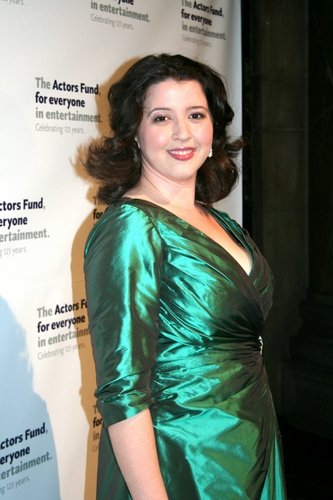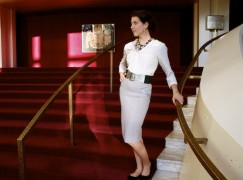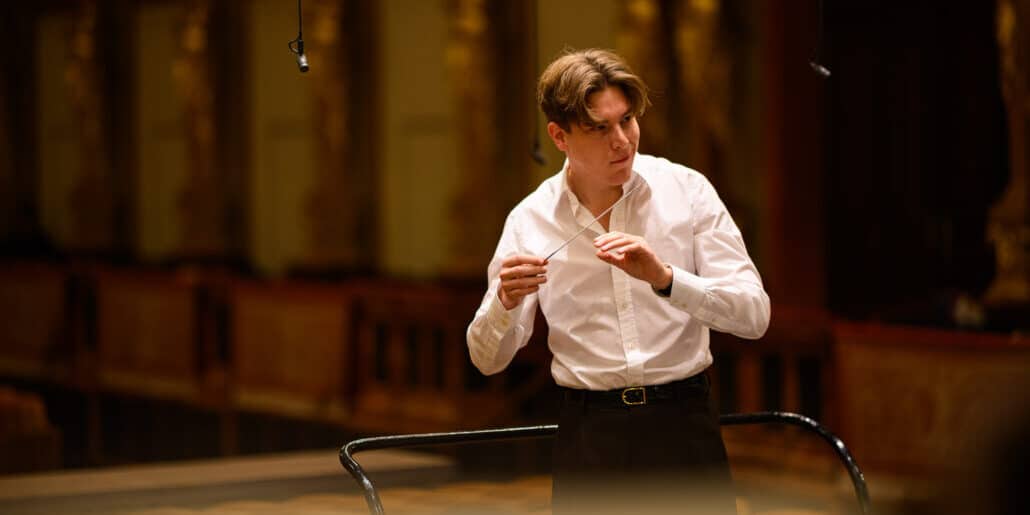A bel canto star says she’s losing roles for being too fat
mainLisette Oropesa is quoted today as saying that overweight women cannot get cast these days in bel canto roles.
Oropesa, 35, says she was ruled out several times for being ‘too fat’.

Oropesa, 2008
She told the Bachtrack site that this ‘voice type . . . is so competitive, you need to look the part or you’ll be disqualified … ‘I thought that I’d worked way too hard and was singing far too well to be stopped before I could even enter the room… Someone would look at my photograph and say, ‘No. Too fat!’’

Oropesa, 2013
Lisette has since gone on a dramatic weight-loss programme after nearing 15 stone (95kg). She says critics and audiences share responsibility with casting directors for the anti-fat prejudice.

Oropesa, 2018
See also An opera singer confronts her body shape and Alice Coote: An open letter to opera critics





Yep..I can write a whole book about this subject.
The opera business is full of “metoo” with or without sex.
This woman is not fat. This is ridiculous.
The photos show somebody who is clearly not fat, but the article says that before the diet she was 95 kg. So a bit over, but less than some others.
She’s not the first, and she probably won’t be the last who has had to go on a “weight-loss programme”. It was probably good for her overall health, although I really don’t like such focus on appearance (not just for singers, also thinking of all the sexy photos of violinists and pianists in off-the-shoulder dresses, for example) – and what about the men? Does anybody ever tell them that they’re too fat?
I go to concerts for the music, not for the appearance of the performer.
“Does anyone every tell men they’re too fat?” Google some reviews of Johan Botha or late-career Pavarotti. Allan Clayton’s had unflattering comments (so much so that he calls himself “fatboyclayton” on Twitter to forestall them). At least one eminent (male) conductor with a big US orchestra, to my knowledge, has had serious eating issues connected to body image.
I talk as a singer who was with Kent and Scottish Opera, and appearance today is part and parcel of the job. You have to make opera credible and the characters credible, given here in England at least we have had a straight theatre tradition second to none all the time I’ve been around. You wouldn’t expect to go to see Shakespeare’s Othello with some fat Desdemona trying to strut the stage. You have to be able to move around a stage and dance in ways the older singers never had to do. Call them better singers if you like, but times have now changed, and the days of ‘parking and barking’ in most places of worth are mercifully well and truly over. Weight has also got to do with height as well, and you can’t tell from this photo how tall this ‘bel canto’ singer actually is. She is not obese, but she is certainly big for her build. You sing on trained muscles not fat. Forget about concert work – that is different and the criteria are different. No one is saying that opera singers should be the size of the modelling cat-walk eating lettuce leaves all the time, or go through the awful grueling regime that ballet dancers do and verging in anorexia. But at the end of the day, you have to be artistically convincing. Also the simple fact too is that carrying too much weight around, whoever you are, verging on being fat, as opposed to just a bit overweight, or even obese is no good for either your joints or the functioning of the heart – all needed to be a singer who can act on stage. And now that I actually go and be in the audience more of opera, it’s what I expect, and you must certainly get action at Opera North productions as we will get in Butterfly, Giovanni and Masked Ball in February.
Totally agree with every word here! well put! Brava!
When I saw her in LUCIA DI LAMMERMOOR, she didn’t strike me as being at all ‘too fat’. And as Zelda says, ‘what about the men?’ People just thought Pavarotti’s obesity was a bit of a joke…….and Johann Botha maybe ate himself into an early grave……
Yes, I go to CONCERTS for the music, with opera it’s a bit more problematic……
I go to operas for the music too – and the drama, and the story, and the magic of the performance; but disappointments (other than music-related) come from wooden and clumsy movements and occasionally too “experimental” productions. I go to all the cinema opera performances I can fit in (as they are more frequent and cheaper than the live ones which I also try to see) – and I think the emphasis on appearance has definitely been affected by all those close-ups.
Men singers have to face it as well. An excellent tenor Ramon Vargas is one of them.
It’s not over before the fat lady sings…
This title is misleading. Ms. Oropesa is definitely not losing roles now because she is too fat (verb tenses are your friend). She was larger than she’d liked once. She was told she needed to change, should she want to be more viable. She made a lifestyle choice. And she did indeed lose weight. Her singing is stronger than ever. And she’s singing leading roles in this repertoire everywhere…not losing them.
Judging by the number of photographs of the lovely Lisette Oropesa that are available, especially on her own platforms, it is easy to see how much she has benefited from looking after her health. Be it production shots, exercising photographs, or fashion styled photo shoots, Lisette looks to be very comfortable with her image and long may she thrill audiences with her performances.
The versatility of artists like Lisette can only be enhanced when they are able to slip into any costume and be comfortable and credible in any vision that they and the opera director can imagine.
It’s all about versatility and credibility these days.
Opera competes with and is compared against many visual arts in a way that it was exempt in previous generations.
The revolution of home and personal entertainment aided by the explosion of high definition image capturing, brings the opera image cruelly into focus.
Any performance that does not have cinematic standards is now exposed, be it by the digital production shots, cinema and streamed performance, or the fans smart phone, every detail is captured and posted.
The bigger debate, rather than the fitness of the soprano or the firmness of the abs of the baritone, is that the very action of staged singing, when judged using today’s aperture, appears very ‘un-naturalistic’ and crude. Rolling news, the internet, digital media, advances in science and technology, means that the audience has so many tools available and so much information at their fingertips to compare, research, judge and debate culture experiences.
By taking the performance out of the confines that the convention has existed within and hidden behind, namely the 18th and 19th century theatres, it becomes exposed in forensic detail. The magic of the operatic stage, the elusion, the escapism, the storytelling conventions and production styles become cruelly transparent and can feel contrived and old fashioned.
The material itself, again mainly 18th and 19th century, is attacked and staggers to make a stand, like an ancient brightly coloured Napoleonic solider facing camouflage, stealth and drone warfare.
The medium has to evolve or face being blown to pieces and confined to the history books.
The material, the venue, the performers and practitioners all need to adapt. The audience has evolved at a far greater pace than the operatic medium. The audience demand and expectation is changing rapidly. If the opera world is too slow to adapt, then other cultural and entertainment platforms will win the battle for the audience and soon the funding bodies will invest elsewhere and the opera houses will be empty..
Lisette Oropesa was profiled in Runner’s World magazine a few years ago, having finished at least one marathon. She was quite svelte when I saw her in the Met’s Falstaff in 2013. Beautiful singing, by the way.
In entertainment it’s not enough to be talented; you have to be good looking also. Especially if you are female.
Some people have remarked on the health benefits of losing weight. No argument there; but would you call the “fat” picture (2008, green dress) unhealthy?
Yes. Obesity is clinically defined as having a BMI of 30 or above. In that photo & by her own admission in many interviews, she was 95kg & therefore had a BMI of 34.48, well & in fact dangerously beyond the threshold for obesity. We’ve grown so accustomed to getting fatter & fatter by the day/month/year in the affluent world that it’s common not to perceive someone as ‘all that fat’ when they are in fact obese.
15 stone? I had to get the calculator to convert that… 210 pounds!
Unless she’s 6’3″ that’s a lot.
Met doesnt seem to worry – they have at least three sopranos who are definitely “overweight’ who sing with them often enough. Perhaps the real issue was her weight was adversely affecting the quality of her voice? Anyhow, Im glad she has lost some weight – she’ll be better for it – and that she is getting roles.
Well put Margot 🙂 I agree :-))
Supply and demand. Start with the thought that all singers are desired to be “in shape”, male or female. Then look at the type of Opera she was singing, which is Bel Canto. Why are people comparing such a rare beast as Johann Botha, a Wagnerian Tenor, to a soprano singing Bel Canto which is a dime a dozen classification. Of course they would have liked Botha and Pav etc to be smaller but do you think they are going to lose work because of it, after decades of stardom and no one to really replace them? Of course not. If she’s up against tons of delicate little starlets weighing 80 something kg’s (which is a lot for a women in this image obsessed era), of course she is going to lose roles.
You can barely see a skinny person onstage, and their movements don’t register the way a zaftig person’s do, and that’s precisely what you need for opera. She should sue them. Dramatic weight loss is a danger to the body and also the voice. It’s a shame she felt she had to give in to the pressure.
I soooooo agree with you Francis Assisy!